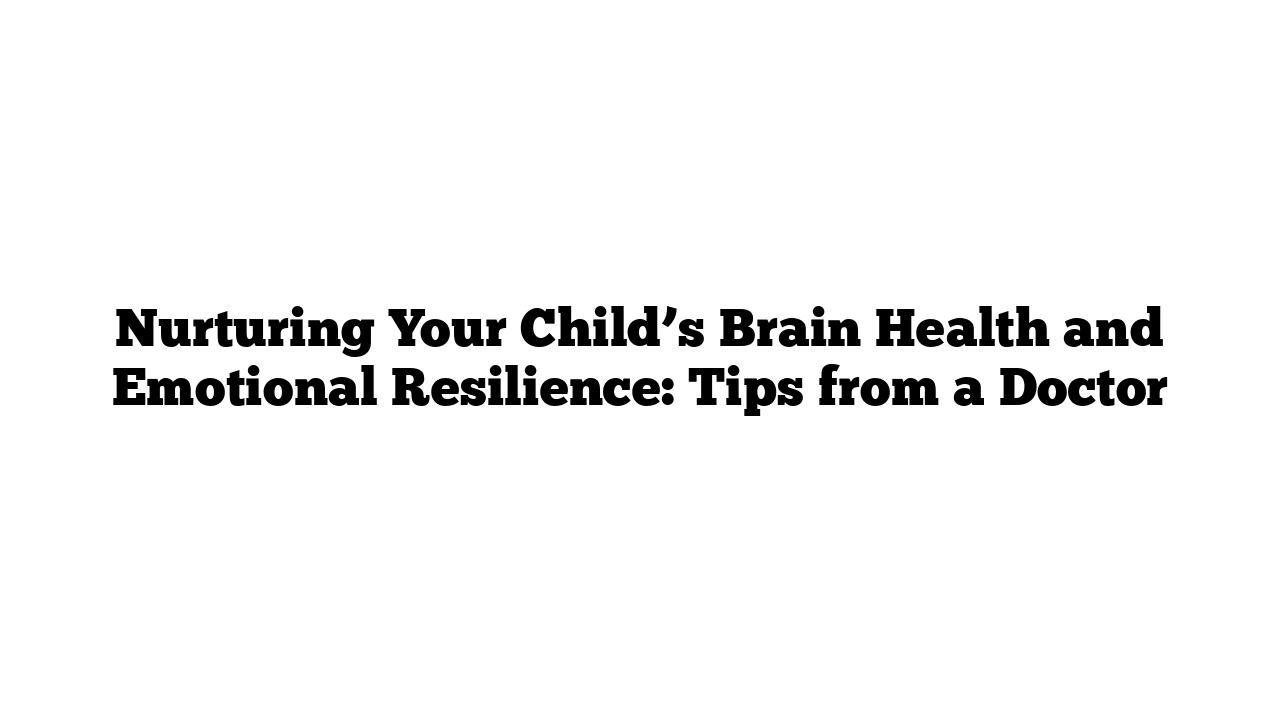In today’s world, supporting children’s mental well-being and brain health is more crucial than ever. Challenges such as stress, technology overload, and busy lifestyles can impact a child’s developing mind. With the right guidance and strategies, parents can strengthen their child’s brain health and help them build emotional resilience.
Why Brain Health Matters in Childhood
The early years of a child’s life are foundational. By age eight, their brain is like a sponge, absorbing information and experiences. This period is critical because their brains are still forming essential neural pathways that shape how they think, feel, and respond to stress.
“Healthy brain development supports lifelong learning and emotional well-being,” explains Dr. Sarah Collins, a child psychiatrist in the USA. When children’s brains are healthy, they can focus better, learn efficiently, and manage emotions constructively. This sets a strong foundation for success and happiness as they grow.
Simple Steps to Support Brain Health
- Provide a Nutritious Diet
- Nutrition plays a powerful role in brain health. Foods rich in essential nutrients like magnesium, zinc, and omega-3s help strengthen cognitive function and emotional stability.
- Magnesium, for example, supports over 300 body processes, including calming the nervous system. Studies show magnesium can improve focus and reduce anxiety in children (Healthline). Natural sources of magnesium include leafy greens, nuts, and whole grains.
- Tip: If your child is a picky eater, consider magnesium supplements after consulting with your pediatrician.
- Encourage Physical Activity
- Regular physical activity boosts blood flow to the brain and releases mood-enhancing chemicals called endorphins. Physical movement, whether through sports or simple outdoor play, also reduces stress hormones and helps kids cope with everyday challenges.
- For kids under eight, activities like dancing, running, or playground games are effective ways to stimulate brain growth.
- Manage Screen Time
- Digital devices can stimulate the brain but also contribute to stress and disrupt sleep. Balance is essential. The American Academy of Pediatrics (AAP) recommends no more than one hour of high-quality screen time for kids aged two to five and suggests prioritizing screen-free family time for older children.
- Encourage tech-free activities like reading, puzzles, or art to foster creative thinking.
- Prioritize Quality Sleep
- Sleep is a critical part of brain development. During deep sleep, the brain processes daily information and strengthens memory. Children aged six to twelve need around 9-12 hours of sleep each night.
- A calming bedtime routine can help. Try dimming lights, reading, or using soothing sounds to prepare them for sleep.
- Use Calming Supplements with Care
- Magnesium and vitamin D are two supplements that promote brain health. Magnesium, especially, is known for its calming effects and can aid children struggling with stress or hyperactivity.
- Consider options like magnesium glycinate, which is gentle on the stomach. Always consult your healthcare provider before starting supplements.
Fostering Emotional Resilience
In addition to brain health, children need skills to handle life’s ups and downs. Emotional resilience—the ability to bounce back from stress—can be cultivated through supportive habits:
- Model Emotional Regulation
- Children learn how to manage their emotions by observing adults. When parents model calm responses, children are more likely to develop similar habits. For example, if you feel stressed, take a moment to breathe deeply and explain to your child why it’s helpful. This simple act teaches them self-soothing.
- Encourage Open Communication
- Create a safe space for children to share their feelings. Encourage open conversations about what they’re experiencing, and listen without judgment. This practice builds trust and shows them that it’s okay to express emotions.
- Teach Problem-Solving Skills
- Empower kids to think through challenges rather than avoiding them. Practice role-playing common scenarios, like disagreements with friends or handling frustration over schoolwork. Teaching problem-solving early builds confidence and adaptability.
Building a Healthy Foundation for Life
Nurturing your child’s brain health and emotional resilience sets them up for lifelong success. By focusing on nutrition, sleep, balanced screen time, and emotional skills, you can help them thrive in a fast-paced world. For more tips and science-backed solutions, visit medicaltimes.io.
